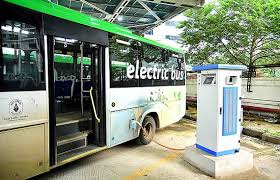30 December 2025

Unlock Infinite Advantages: Subscribe to Annual Membership
Image Credits: Silicon India
In a decisive step toward electrifying public transport and advancing sustainable urban mobility, the International Finance Corporation (IFC) has committed $137 million to two of India’s leading e-mobility players. The financing package allocates $100 million to JBM ECOLIFE (part of JBM Auto Limited), a major manufacturer and operator of electric buses, and $37 million in mezzanine capital to GreenCell Mobility, the country’s largest OEM-agnostic e-bus operator backed by Eversource Capital.
The investments are set to deliver a wide-ranging impact by deploying 4,000 e-buses and charging stations across 39 municipalities, while generating 12,000 jobs, including opportunities for women. The beneficiary states and territories include Maharashtra, Assam, Gujarat, Andhra Pradesh, Bihar, Madhya Pradesh, Puducherry, and New Delhi.
Significantly, the projects mark a market first by introducing a formal Payment Security Mechanism to safeguard against payment delays by municipal and state transport undertakings. This innovation is expected to strengthen the bankability of e-bus projects and provide a template for replication nationwide. Complementing this, the World Bank Group has supported the Indian government in designing a master concession agreement for the PM eBus SEWA initiative, streamlining tenders for municipal concessions and embedding the PSM into operations.
E-mobility is the future and we are making it possible through investments in leaders like JBM and GreenCell, said Makhtar Diop, Managing Director of IFC. Together, we are setting benchmarks for sustainable, resilient, and globally replicable urban transport a foundational pillar of India’s urban transformation agenda. By leveraging innovative financing and pioneering payment security mechanisms, we are mobilizing private capital at scale to support national priorities.”
India, with 800,000 public buses and 1.2 million private buses, represents one of the world’s largest markets for electrification. The IFC’s investment underscores the World Bank Group’s broader strategy to accelerate e-mobility, curb transport emissions, and support India’s emergence as a global hub for EV manufacturing. Aligned with government priorities and Production-Linked Incentive (PLI) schemes, these efforts aim to deepen collaboration with subnational entities and fast-track the nation’s vision of sustainable, future-ready cities.
This move not only advances India’s climate and mobility goals but also establishes a model that could reshape how cities worldwide finance and scale next-generation public transport systems.
30 December 2025
27 October 2025
24 October 2025
23 October 2025
We offer automotive expertise for market projections and customizable research, adaptable to diverse strategic approaches.
Contact Us